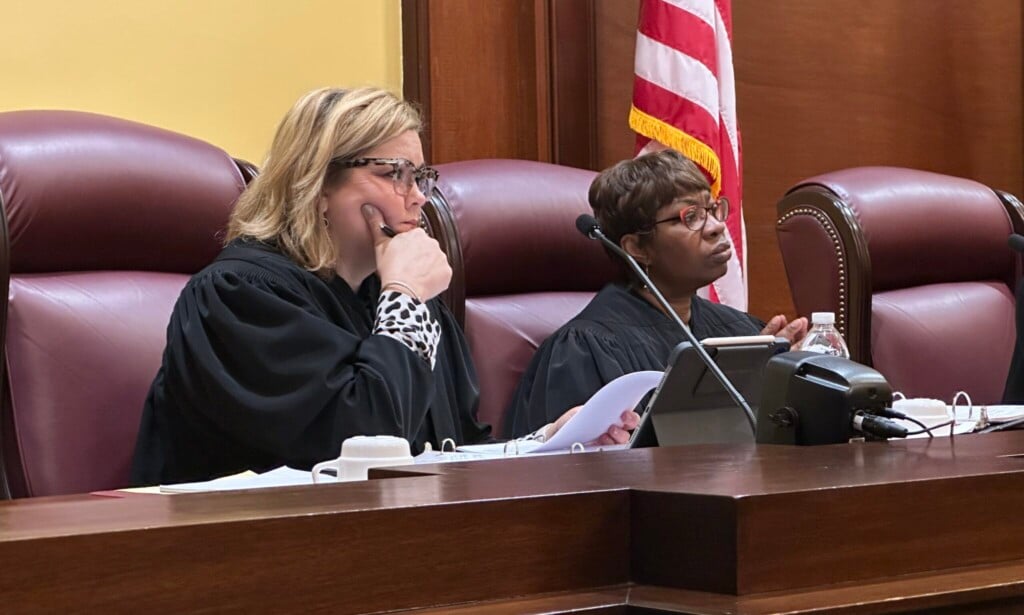Rep. Michael Johnson of District 23 unpacks views on abortion, education, and gun laws ahead of election
Representative Michael Johnson, born and raised in Kansas City, has lived in District 23—which encompasses parts of the northeast side of town—for most of his life, and he wouldn’t have it any other way. He’s beyond proud of his district and the people he’s represented since 2021.
“I would do it for free, and I do it with love, and I don’t do it with any other intentions,” Johnson says.
Before running for state rep., Johnson worked two part-time jobs—one at Costco and one in city parks and rec—while running his own insurance agency, Johnson Hazley Agency, LLC, which he continues to operate. He’s also a U.S. Army veteran.
Johnson isn’t the first in his family to get involved in politics. His uncle Charles A. Hazley served on the Kansas City Council in the 3rd district-at-large from 1971 to 1991 and was one of the most important politicians in the city during that time. Johnson decided to run for state rep. in 2020 when his family called him and asked him if he was going to continue the family’s legacy in politics.
Since taking office, Johnson has sponsored multiple bills relating to mental health, including a bill that would set provisions relating to mental health leave for workers, a bill that would mandate schools to excuse students with mental or behavioral health concerns from school, and a bill that would oblige the mental health department to apply for a federal grant to implement a statewide mobile mental health unit program. He’s currently working with nonprofit organization Elevating Men to support men’s mental health.
In his next term, Johnson would like to introduce legislation that ensures schools have mental health counselors, as he believes they are better equipped to deal with student mental health crises. He’d also like to continue to push for mobile mental health units.
“The stigma with mental health is a lot of people aren’t going to show up to brick-and-mortar because it’s like putting our business out there, and in my community—the minority communities—has always been a stereotype for you not to be able to tell people what goes on inside of your home,” he says. “So the mental health advocacy, as far as I’m concerned, plays a part in our everyday life and everybody at some point. Especially since we’ve been through COVID and some type of post-traumatic stress disorder just from going through it, and a lot of us are still living with those nightmares, with that anxiety, that stress, and those senses of depression. So, I think that it’s something that we need to make an easy conversation piece, and we need to make sure that we have safe places to discuss these things.”
Johnson supported the firearms constitutional amendment proposed after the Chiefs parade shooting and recently sponsored a bill that would modify the definition of machine guns to include firearms that were initially manufactured as machine guns or were altered by any manufactured or homemade component. In the future, Johnson says he’s interested in looking at the accessibility to ammunition as an issue.
He says he’s most proud of sponsoring legislation that expanded broadband Internet access to underserved communities.
“It’s more than just the connectivity,” Johnson says. “It’s looking at telehealth, it’s looking at jobs and education. And so, it’s no longer just something that you should have if you decide to have it. It’s more of a necessity to make sure that we have that connectivity throughout the whole state of Missouri.”
Johnson is also passionate about workers’ rights—having been endorsed by labor organizations such as Missouri AFL-CIO—and creating more opportunities for Missouri residents. He states that he champions wage increases and wants to not only create more jobs, but better jobs—In part, with the hope that more people who attend school and graduate in Missouri will choose to stay.
“I think that it’ll give us a great opportunity to make sure that, in workforce development, we have more vocational training in our schools, as well as more certification training that will allow us to sustain some of those that are coming out of college with degrees,” Johnson says. “And also, those that are certified for the labor work field as well, so that we can sustain some of those people throughout the state of Missouri because we’re losing a lot of our people that do train and do graduate and get a diploma here in Missouri.”
Having grown up in the public school system, Johnson supports public education. But private and charter schools are equally important, he says.
“You can’t just be team public school, even though I’m born and bred in the public school system,” he says. “My granddaughter attends a charter. So you have to make sure that you have an even keel about things, you don’t make emotional decisions, and that you vote for your district and your constituents. We need to make sure that the education system is fair across the board, be it if it’s public school, private, or also in our charter systems. So what I mean by that is getting each child an opportunity to have a great education, regardless of where they go. And I think that we need a more even playing field as far as the finances are concerned for all of those educational entities.”
As to the issue that is toward the front of nearly every Missouri voter’s mind at the moment, abortion, Johnson is fully supportive of a woman’s right to choose.
“I think a woman should have access to her reproductive rights in any situation,” he says. “And I think that women know more about their body than any man, and they know what they need. I think that they have that right, and they deserve the right to make those decisions based on the fact that, who are we to tell them exactly what it is they need? No one should be able to ever have the right to tell them what they can do with their bodies.”
When it comes to passing legislation, both in his past two terms and his upcoming term, Johnson does his best to negotiate with his colleagues and to represent the voices of District 23.
“A lot of times, you just need to get to sit down with one another, spend time telling each other about your history, on who you are, and generally making a connection,” says Johnson of working with others in the state legislature. “And then, I think it makes for better opportunities business-wise because that’s really what it is. They want to take things back home to their district. You want to take things back home to your district.”





